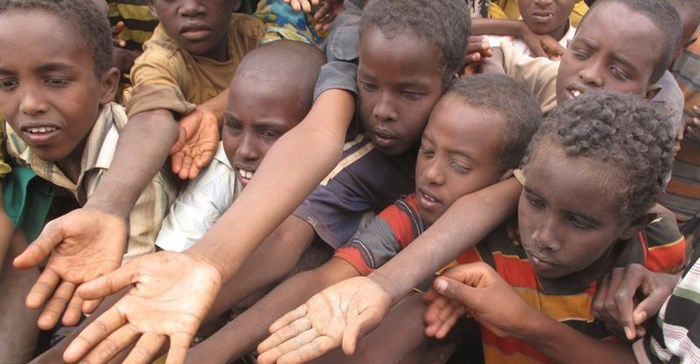The theme of World Food day 2015 brings attention to social "social protection and agriculture - breaking the cycle of rural poverty". Africa's population continues to grow and is increasingly facing issues of food insecurity and malnutrition. This should be a top priority on the international development agenda for the continent or risk a looming food insecurity crisis.

©Sadik Güleç via
123RF - Children stretch out their hands at the Dadaab refugee camp where thousands of Somalian wait for help because of hunger in Dadaab, Somalia.
According to Klaus Eckstein, CEO for Bayer Southern Africa: "To put this into perspective, there are 239 million undernourished people, which is just shy of being a quarter of Africa's current 1.2 billion* population. Considering that this population has been projected to double to 2.4 billion by 2050, if we are unable to address the issues that are suppressing Africa's food security now, we will run into an emergency situation in the next two decades - and one that we possibly can't even begin to fully comprehend in real terms just yet."
This warning comes despite significant strides and ongoing measures by government, private sector and local and international non-government organisations (NGOs), alike, to reduce the number of undernourished people in Africa. In fact, it is estimated that about 239 million people are still suffering from undernourishment and chronic hunger - and currently there are few signs of this number decreasing dramatically in time to come.
The role of social protection
The 16th of October annually commemorates World Food Day - which was established by the Food and Agriculture Organisation of the United Nations (FAO) - and the theme for 2015 aims to highlight the crucial role that social protection has to play in reducing chronic food insecurity and poverty, through direct access to food or the means to buy food.
"This is quite fitting for Africa, as the continent is still plagued with persistently high numbers of chronic hunger and poverty and, without immediate and sustainable corrective action to address food security, the continent will be faced with a state of emergency in the future. Moreover, 30% of food is wasted due to post-harvest losses, which is particularly prevalent in Africa.
"For this reason, it becomes more pertinent to partner with various organisations in preventing this though solutions such as protection of grain in storage and the extension of shelf life of fresh produce through improved crop protection practices," says Eckstein.
The quality and future security of food sources, therefore, should be a top priority on the development agenda for the continent and long-term investment commitments into local enterprises in key agricultural countries or regions are essential to building supply chains of sustainable food sources that will meet the future demand of the growing population.
The agriculture potential of Africa and the challenges it faces
"Africa has the agricultural potential to not only be self-sustaining - but to feed the world. While this is an incredible scope, the continent does boast approximately 60%4 of the world's uncultivated and arable land," adds Eckstein.
However, until 2009, agriculture contributed about 12.7% to the continent's gross domestic product (GDP) and, regrettably GDP contributions by the agricultural sector haven't increased significantly over the last six years. Additionally, currently South Africa is the only country on the continent that can boast food self-sufficiency - in terms of production for local consumption, as well as being a net food exporter - and Africa (overall) has become a net food importer.
Eckstein indicates: "This is because of challenges such as; extremely low (compared to global average) yields and productivity on African farms, coupled with rapidly growing population and poor supporting infrastructure - not to mention the duality of the sector make up between commercial and smallholder or subsistence farming and climate change. In fact, South Africa can face the risk of not being self-sufficient due to the prevailing drought in both the summer and winter seasons and therefore, as an industry we need to always look at improved crop protection systems and partnerships that can partially reduce this risk."
Investing for inclusive growth and sustainable prosperity
With renewed interest in this sector, strides have been made. Long-term investment and commitments into local agricultural and farming enterprises - both small and commercial - are essential to building supply chains for sustainable food sources that will meet demand and future export potential. "Yet, over and above these efforts, to be able to provide enough food for ourselves, our livestock and become more prominent exporters of food products well into the future, agriculture must become more efficient. And this will require sustainable intensification of agriculture - in producing more food on less land in a more sustainable way," says Eckstein.
Achieving this - and with increasing conflict over land and scarce water resources - will require innovative partnerships between different stakeholders and political support. This also means considerable investments from both private and public sectors in innovative solutions that, for instance, will improve cultivation methods, seeds tailored to local growing environments and responsible use of crop protection options.
"An effective and sustainable intensification of agriculture is paramount to eliminate hunger on the continent, however, this will require embracing the interconnections and complexities of our food systems and taking an integrated approach that boasts constant collaboration between governments, the agricultural and science communities to cultivate solutions that will yield a sustainable supply of safe, nutritious and plentiful food sources for years to come," concludes Eckstein.
*Unicef, Generation 2030, Africa Report































